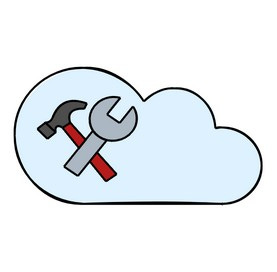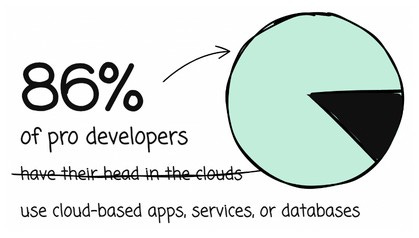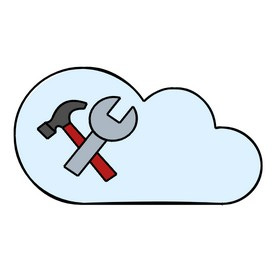8 out of 10 devs use the cloud. What does that mean for you?
Cloud skills are non-negotiable in modern software development. Here’s how developers across the industry are using the cloud.
Note: In case you missed it, my last post explored the basics of the cloud and how it operates. Today, we’re focused on HOW developers use the cloud for their work, including exploring career specializations where cloud skills are non-negotiable. And stay tuned for next week, where I’ll share exactly what skills you'll need (and how to start building them).
By now, most companies — from small startups to Fortune 500 giants — have embraced cloud services. As a result, most developers have embraced cloud services for their daily workflows.
This shift to cloud is for the better.
The cloud lets developers easily store data and access powerful computing resources. In the past, developers had to manage physical servers (which was cumbersome, to say the least). Today, the cloud automates essential tasks like infrastructure management, making it easy for developers to scale apps, push updates, and more.
By freeing developers from hardware maintenance, the cloud lets us focus on what matters most: building features and solving real problems. In today's cloud-driven world, developers who know how to leverage the cloud are in high demand.
But I get it — "leveraging the cloud" can feel a bit abstract. After all, the cloud isn’t even something you can see or touch. Today, I want to make it more concrete, so that you'll have a better idea of how the cloud will play a role in your future coding career.
We'll cover:
Why developers use the cloud
What it actually means to leverage the cloud
How the cloud changed daily work for different developers
Let's get started.
Which developers use the cloud (and why)?
Most modern applications rely on cloud-based services for scalability, storage, and infrastructure, which means that most developers use cloud services.
You don't have to be a “cloud specialist," like a Cloud Architect, to use the cloud. After all, most devs aren't cloud specialists — and yet, 86% of professional developers work in cloud or hybrid environments, according to the latest Stack Overflow Developer Survey.
Only a select few roles may not need cloud skills (e.g., Operating System Engineers, who focus on hardware interaction and system optimization). For the rest of developers, the global shift toward cloud computing means we use cloud services for daily workflows.
Leveraging the cloud means that your work involves some cloud-based applications, services, or databases. These cloud-based tools are hugely beneficial.
The cloud streamlines the development workflow by:
Setting up development environments
Managing databases
Handling security monitoring
Automating processes
And more
The result? Developers get to be more productive (with less elbow grease).
Depending on their roles and responsibilities, different developers use the cloud in unique ways.
Let’s explore how three common types of developer roles rely on the cloud to work more efficiently.
How 3 different devs use the cloud
Remember: you don't have to be a cloud specialist to work with cloud. In fact, the relevance of the cloud for non-specialist roles really demonstrates the widespread benefit of cloud technology for developers in general.
So, let’s take a quick look at how a few common developer roles use cloud technology, and why it benefits them.
1. Web developer
Web developers build and maintain websites, focusing on the front-end (what users see) or the back-end (technical operations behind the scenes). Sometimes, they do both.
Before the cloud, web developers had to set up and maintain their own physical machines (servers) to run their websites, which involved more manual, technical work and higher costs.
Now, cloud platforms handle much of that for them. Developers can host their applications online by using the internet instead of physical servers, and the cloud automatically adds or reduces computing power depending on how many people are using the app at a time – helping ensure both smooth performance and lower costs.
Web developers use cloud tools to:
Launch apps quickly: Deploy new apps or updates using tools like AWS Elastic Beanstalk, without worrying about complicated server setups.
Ensure sites perform well: With cloud tools like AWS Auto Scaling and CloudFront, web devs can keep websites running fast and smoothly, even during traffic spikes or issues.
Save money: Cloud platforms charge for resources used, making them budget-friendly. Tools like AWS Cost Explorer or Azure Cost Management help both individual developers and companies monitor their use and optimize costs accordingly.
2. DevOps engineer (Developer Operations)
DevOps engineers create systems that automatically handle tasks like testing, deployment, and infrastructure management. DevOps engineers ensure efficient app releases, help ensure that apps work well with other digital tools and services, and keep track of overall system operations.
Like web developers, DevOps engineers once had to manage physical servers and infrastructure by hand, which was complex and time-consuming. Thanks to the cloud, today’s DevOps engineers don’t have to worry about physical infrastructure. By automating tasks like app building, testing, deployment, and scaling, cloud platforms help reduce manual work for DevOps engineers — streamlining the overall development process.
DevOps engineers can leverage the cloud to:
Automate testing and publishing: Using cloud tools like Jenkins to run tests and launch updates, reducing manual work.
Scale apps: Using services like AWS Auto Scaling or Kubernetes to add or reduce resources (like servers) based on how many people are using the app, ensuring apps run smoothly.
Monitor and log app performance: Track performance in real-time to identify issues early, with tools like AWS CloudWatch or Azure Monitor
3. Data engineer
Data engineers are like the stewards of data. They work with large collections of data and set up automated systems that move data from one place to another, preparing it to be analyzed and used for reports.
The role of data engineer exists purely because the cloud made Big Data possible.
Big Data refers to the massive amounts of information collected from interconnected apps and devices. Storing and processing all this data would have been nearly impossible using only pre-cloud technology like physical servers, but now, the cloud now enables both processing and analysis to drive decision-making. Data engineers play a key role in organizing and preparing data to provide accurate insights for leaders.
Data engineers take advantage of cloud tools to:
Process large amounts of data quickly: Handle and analyze datasets faster than a regular computer or server, with tools like AWS EMR or Google BigQuery.
Automate how data moves between systems: Set up automated processes to prepare data for analysis with tools like AWS Glue or Google Cloud Dataflow.
Automatically adjust resources: Leveraging cloud services like AWS Lambda or Azure Data Factory to ensure the right amount of computing power is available when needed. These tools scale up when there’s a lot of data to process, and scale down when there's less, so you don’t have to manage it manually.
Fun fact: Data engineering is a somewhat newer role, compared to web development – it exists primarily because of the rise of cloud computing!
Get your head in the cloud(s)
The cloud is a career multiplier, offering countless ways and roles where developers interact with cloud technology. While it may still seem a little abstract at this stage, adding the right cloud skills to your developer toolkit is one of the most powerful steps you can take.
In next week’s post, I'll give actionable tips on how you can learn cloud skills that help you excel in your career (and how to get some hands-on practice)
In the meantime, you can keep building cloud computing foundations with Educative's hands-on course: Cloud Computing Fundamentals.
Happy learning!
— Fahim










